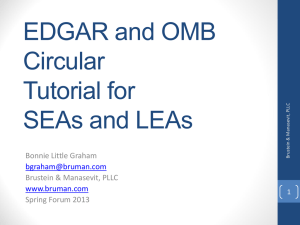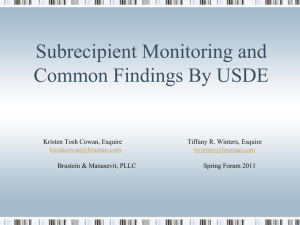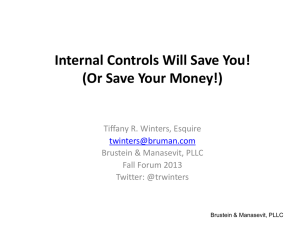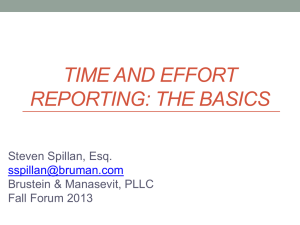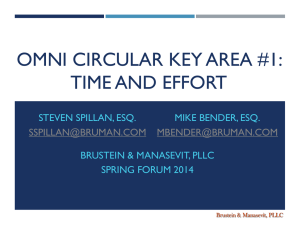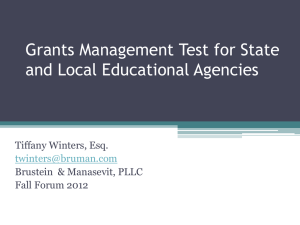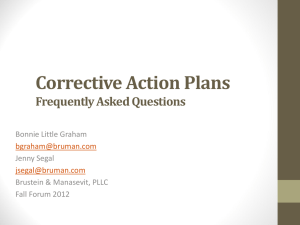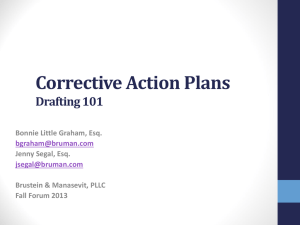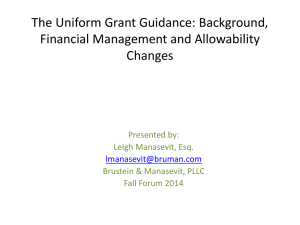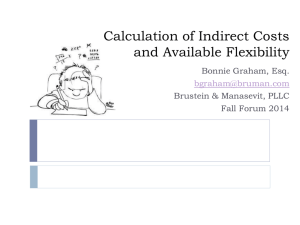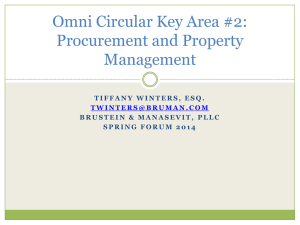Allowability of Meals and Conferences
advertisement
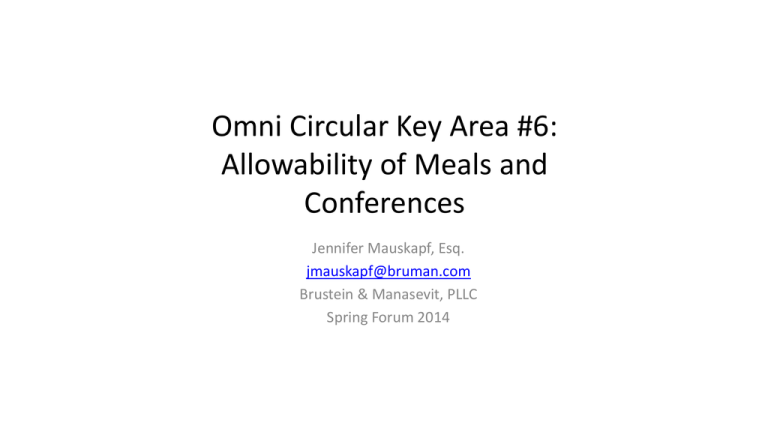
Omni Circular Key Area #6: Allowability of Meals and Conferences Jennifer Mauskapf, Esq. jmauskapf@bruman.com Brustein & Manasevit, PLLC Spring Forum 2014 Agenda • • • • Current Rule OIG Concerns ED Guidance Omni-Circular Rules Brustein & Manasevit, PLLC 2 Current Law: A-87 / A-21 • Costs of meals and transportation if primary purpose of meeting / conference is dissemination of technical information Brustein & Manasevit, PLLC 3 OIG Concerns – Meetings and Conferences • OIGs have found conferences held by recipients where perperson cost of daily catering was between 189% and 400% of applicable location’s federal per diem for meals and incidental expenses Brustein & Manasevit, PLLC 4 OIG Concerns – Meetings and Conferences • OMB should limit meal costs to federal per diem rates and document a cost comparison of at least three sites to determine most cost-advantageous location Brustein & Manasevit, PLLC 5 ED GUIDANCE ON USE OF FEDERAL FUNDS FOR FOOD Brustein & Manasevit, PLLC 6 ESEA Title II, Part A FAQ ‘Guidance’ • Issued May 2013 via e-mail • Available on-line: http://www2.ed.gov/policy/fund/guid/gposbul/faqs-granteeconferences-may-2013.doc • ED Effort to take “greater care in enforcing and monitoring” these costs • Title II, Part A office is responsible for the largest amount of grant funds related to professional development • Very high burden of proof to show that paying for food is necessary Brustein & Manasevit, PLLC 7 ESEA Title II, Part A FAQ ‘Guidance’ (cont.) • Q&A #3: Consider whether hosting a meeting or conference is the most effective or efficient way to achieve the desired result. • Q&A #6: • When hosting a meeting, structure the agenda so there is time for participants to purchase their own food, beverages, or snacks. • Consider a location in which participants have easy access to food and beverages. Brustein & Manasevit, PLLC 8 ESEA Title II, Part A FAQ ‘Guidance’ (cont.) • Q&A #7: In virtually all cases, using grant funds to pay for food and beverages for receptions and “networking” sessions is not justified • Q&As #8, 9: Beware of ‘free’ food and beverages embedded in a contract for meeting space; ask hotel to ‘back out’ such costs. • Q&A #13: May offer meeting participants the option of paying for food and beverages and arrange for items to be available at the meeting. Brustein & Manasevit, PLLC 9 Weight of this Guidance? • Does not meet standard of “Good Guidance” (OMB Bulletin No. 07-02) • SASA Deputy Director clarified applicability of this guidance in June 2013: – This new guidance is generally intended to apply to professional meetings, including those that you may have with LEA staff, and not to school-based events such as a Title I parent meeting. As a result, as long as there is a connection to a programmatic purpose and the cost is reasonable, an LEA may continue to provide food at Title I parent meetings. Brustein & Manasevit, PLLC 10 ED Office of General Counsel Mythbusters • National Association of State Title I Directors, February 2014 • MYTH: Title I, Part A funds may not be used for food at meetings • HOWEVER: Very high burden of proof to show that paying for food and beverages with Federal funds is necessary to meet the goals and objectives of a Federal grant. • Structure agenda to allow participants time to purchase their own food • Consider a location with easy access to food • ED Clarification letter to FAQs: http://www.bruman.com/wp-content/uploads/2010/10/Use-ofFunds-meals-02-20-14.pdf Brustein & Manasevit, PLLC 11 ED Office of General Counsel Mythbusters (cont.) • “Working Lunch” may be allowable. Factors to consider: 1. Is a working lunch necessary? 2. Is the portion of the agenda to be carried out during lunch substantive and integral to the overall purpose of the meeting? 3. Is there a genuine time constraint that requires the working lunch? 4. If a working lunch is necessary, is the cost of the working lunch reasonable? 5. Has the SEA or LEA carefully documented that a working lunch is both reasonable and necessary? Brustein & Manasevit, PLLC 12 OMNI-CIRCULAR RULES IMPACTING CONFERENCES AND FOOD Brustein & Manasevit, PLLC 13 Conferences Omni-Circular: Section 200.432 • Conference is… – A meeting, retreat, seminar, symposium, workshop or event – Whose primary purposes is the dissemination of technical information beyond the nonFederal entity and – Is necessary and reasonable for successful performance under the Federal award • Allowable conference costs may include rental of facilities, speakers’ fees, costs of meals and refreshments, local transportation and other items incidental to such conferences unless restricted by terms of Federal award. Brustein & Manasevit, PLLC 14 Section 200.432, Conferences (cont.) • Conference hosts/sponsors must exercise discretion and judgment in ensuring that conference costs are appropriate, necessary and managed in a manner that minimizes costs to the Federal award. • Costs of identifying, but not providing, locally available dependent-care resources are allowable. Brustein & Manasevit, PLLC 15 Travel Costs Omni Circular: Section 200.747 • Expenses for transportation, lodging, subsistence, and related items incurred by employees who are on travel for official business • May be charged: – On a per diem or mileage basis; – Actual Costs; or, – A combination of the two—provided the method used is applied to an entire trip and not to selected days of the trip. Brustein & Manasevit, PLLC 16 Section 200.747, Travel Costs (cont.) • To charge to Federal award, must evidence: – Participation of the individual is necessary to the Federal award; and – The costs are reasonable and consistent with the entity’s written travel policy. • In the absence of established policy, the rates established under 5 U.S.C. 5701-11, by GSA, or by the President must apply to travel under Federal awards Brustein & Manasevit, PLLC 17 Section 200.747, Travel Costs (cont.) • May only pay for the “basic least expensive unrestricted accommodations class offered by commercial airlines”, UNLESS: • • • • • Requires circuitous routing; Requires travel during unreasonable hours; Excessively prolongs travel; Results in additional costs that would offset the transportation savings; or, Not reasonably adequate for traveler’s medical needs. • Must justify and document these conditions on a case-by-case basis in order for the use of first-class or business-class airfare to be allowable. Brustein & Manasevit, PLLC 18 Travel Costs Omni Circular: Section 200.747 • Dependent care costs above and beyond regular dependent care that directly result from travel to conferences are allowable provided the costs are: – Direct result of the individual’s travel for the Federal award; – Consistent with entity’s documented travel policy; – Temporary during the travel period. • Travel costs for dependents are unallowable, except for travel of duration of six months or more with prior approval. Brustein & Manasevit, PLLC 19 DISCLAIMER • This presentation is intended solely to provide general information and does not constitute legal advice. Attendance at the presentation or later review of these printed materials does not create an attorney-client relationship with Brustein & Manasevit, PLLC. You should not take any action based upon any information in this presentation without first consulting legal counsel familiar with your particular circumstances. Brustein & Manasevit, PLLC 20
